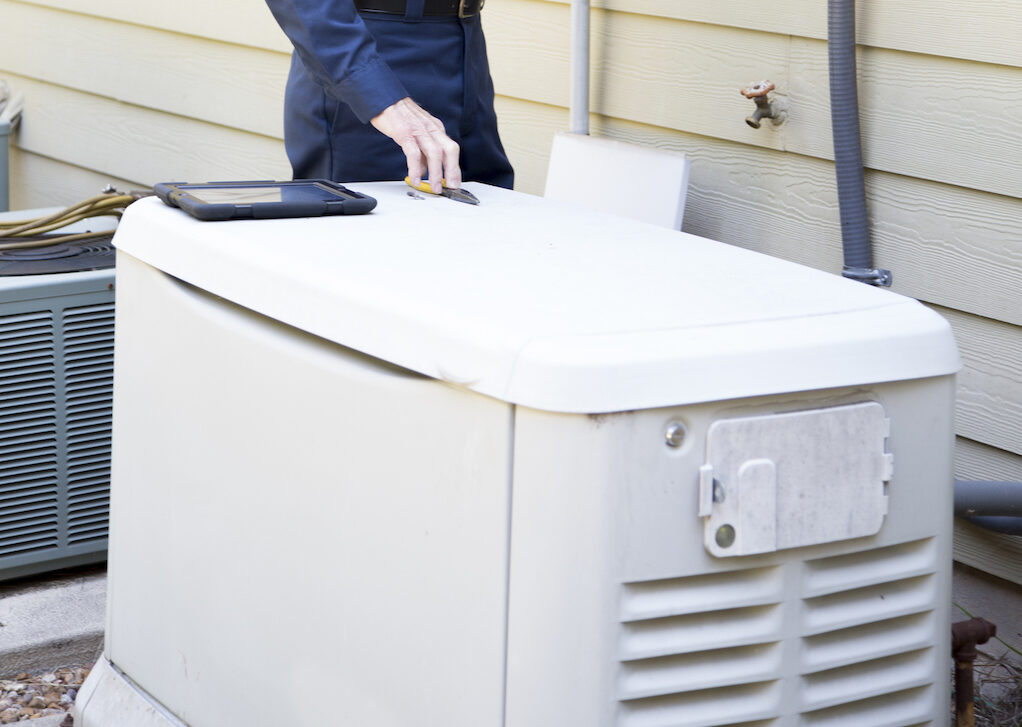
Generator Fuel Choices: How To Choose The Right Type
A generator can use different fuels like gas, diesel, natural gas, and propane. Picking the right one depends on what you need. Think about things like fuel efficiency, availability, and what you’ll use the generator for. Inverter generators, for example, save fuel and are good for sensitive electronics.
Understanding Generator Fuel Types
What fuel should you choose for your generator?
Picking the right fuel is key for both efficiency and dependability, especially during emergencies.
Power units typically include a fuel supply, an engine speed regulator (governor), a voltage regulator, cooling and exhaust systems, and a lubrication system.
All these parts help the machine work well.
Gasoline is a popular choice for smaller models.
It’s easy to find but doesn’t stay good for long.
Diesel is another common option, known for its energy efficiency and long life, making it great for larger units.
Diesel generators are often used in Marion, SC, for both homes and businesses.
Natural gas and propane are also good options.
They burn clean and are often used in home standby systems.
Inverter models are made to give off a stable voltage and frequency, making them more fuel-efficient and quieter—perfect for sensitive electronics.
There are also alternative fuels like bio-diesel, water, sewage gas, and hydrogen, but these are not used as much.
Choosing the right fuel depends on your specific needs and what’s available in your area, ensuring your generator works well when you need it.
Generators and Their Fuel Options
Choosing the right fuel for your power source can be tricky.
What types are there, and which one suits you best? Let’s break it down.
Gasoline is the most common choice for such equipment.
It’s easy to find and fairly accessible.
But, it doesn’t store well and needs frequent refills.
Pros: easy to find, accessible.
Cons: short shelf life, frequent refills.
Diesel models are efficient and last long, especially in bigger units.
Diesel has more energy than gasoline, so it runs longer for the same amount.
Pros: fuel-efficient, long-lasting.
Cons: loud, harder to find in some places.
Propane is a clean option that’s getting more popular.
It doesn’t go bad, so it’s great for emergencies.
Pros: stable, easy to store.
Cons: less energy, bulky tanks.
Natural gas is very efficient and clean.
It’s often used in homes but isn’t always available for units.
Pros: endless supply, clean-burning.
Cons: always needs a gas line.
Choosing the right fuel for your generator in Marion, SC depends on what’s available, how you’ll use it, and how much you can store.
Keep these in mind to make the best choice.
—
Inverter Power Units: Fuel Type Considerations
Wondering which fuel is best for your power unit?
These devices are known for being fuel-efficient and for producing stable voltage and frequency, which is great for sensitive electronics.
They also reduce noise and use less fuel compared to traditional models.
Gasoline is a popular choice because it’s easy to find.
It’s good for smaller units and allows for quick refueling.
But it doesn’t last as long and can go bad if not stored right.
Propane burns clean and produces fewer emissions.
It lasts longer than gasoline but needs more storage space.
It’s a good choice if you want to be eco-friendly and have a reliable power source.
Diesel is usually for bigger power units but is an option for high-demand inverter models.
It’s more energy-dense and good for long-term use but requires more upkeep.
Picking the right fuel depends on your needs.
For folks in Marion, SC, what’s available and flexible can affect your decision.
Choose the fuel that fits your power needs and environmental concerns.
—
House Generators: Choosing the Right Fuel
Are you unsure which fuel is best for your power system?
Here are the main options: gasoline, diesel, natural gas, and propane.
Gasoline is easy to find and good for small units, but it doesn’t last long.
Diesel is more efficient and lasts longer, but it’s bulky and noisy.
Natural gas is handy if your home is already connected to gas lines, providing a steady supply in emergencies.
Propane burns clean, has a long shelf life, and is great for storage.
In emergencies, fuel availability is key.
Gasoline can be found at local stations, while natural gas and propane need existing infrastructure.
Also, think about how the fuel impacts the system.
Diesel engines are tough but might be too much for home use.
Inverter power units, which are good for powering sensitive electronics, work well with efficient fuels like propane.
If you live in Marion, SC, make sure your fuel choice fits your power needs and local availability for the best performance.
—
Power Stations: Fuel Types and Usage
Ever thought about the best fuel for energy units?
Energy units are great for power outages and outdoor fun.
They give you reliable electricity when you need it most.
—
Fuel Options
Traditional power units don’t often use batteries, but solar powered versions do.
They usually use rechargeable lithium-ion or lead-acid batteries.
This makes them super handy for indoor use or places where noise and fumes are a problem.
These models work with modern solar panels, so you can recharge using solar energy, perfect for off-grid living.
Comparing Battery and Solar Power Units
Not sure if a battery or solar generator is right for you in Marion, SC? Let’s break it down.
—
Battery Generators
Battery power sources are known for their quiet operation and portability. They are very reliable and great for powering sensitive electronics. However, they have limited capacity and might not handle long power outages well. Still, battery generators offer instant power without delay.
—
Solar Power Devices
Solar power devices use sunlight, making them an eco-friendly choice.
They are good for long-term sustainability. However, their efficiency depends on the weather.
These devices need little care, but charging can take a while, especially on cloudy days.
In short: If you want quick, easy power for short times, a battery power unit might be best.
If you care more about going green and can wait for charging, a solar power device is a good fit.
Whichever you choose, Mister Sparky Generators in Marion, SC can help you pick the right generator for your needs.
—
Dual-Fuel Power Units: Flexible Fuel Choices
Ever thought about how a power unit can save the day in an emergency?
Dual-fuel machines can run on two kinds of fuel, usually gasoline and propane.
This is a big plus, especially when fuel can be hard to find during a crisis.
Versatility is key with these dual-fuel devices.
You can switch between fuels based on what’s available at the time.
Gasoline and propane are a popular combo.
Gasoline is easy to get but hard to store for long periods.
Propane is stored in sturdy tanks and has a long shelf life.
This dual-fuel setup can make your machine run longer and be more reliable.
Dual-fuel power units are super handy for homeowners in Marion, SC.
Bad weather can mess with fuel supply, but with brands like Mister Sparky Generators, you’re covered.
Flexibility and reliability make these units a smart pick for keeping your home’s power running smoothly.
—
Gas Generators: Traditional and Reliable
Thinking about getting a gas generator but unsure if it’s the right choice?
Power sources, particularly gas models, are a popular pick for many homes and small businesses due to their dependability and ease of use.
One big plus is their wide availability and steady power output.
Gasoline, a common fuel, can be found at any local gas station, making it a handy option, especially during emergencies.
These units excel for smaller applications, offering both portability and practicality.
They’re perfect for things like camping, tailgating, or outdoor events.
Their power varies, so they can handle light household tasks to more demanding ones.
However, consider the downside.
Gasoline is highly flammable, so it needs to be stored safely.
Also, gas engines can be noisier than some other types, which might not be ideal in quiet places.
Despite these drawbacks, gas generators are very versatile.
Mister Sparky Generators in Marion, SC, focuses on this type of power solution.
For those living in Marion, gas generators offer an easy and efficient way to meet your power needs.
—
Understanding Wattage and Fuel Requirements
Do you know how matching wattage to the right fuel type can make your power generator more efficient and reliable?
Knowing your machine’s wattage and fuel needs is key to getting the best performance.
Power units come in different power outputs, measured in watts, and the type of fuel you use affects their running efficiency and lifespan.
Such devices can run on gasoline, diesel, natural gas, or propane.
Gasoline-powered machines are easy to get in places like Marion, SC, but can burn through fuel quickly.
Diesel-powered options are fuel-efficient and durable, making them good for heavy use.
Inverter models are great for sensitive electronics because they produce stable power with electronic inverters.
These are fuel-efficient and quiet, which helps keep your devices safe and the noise level down.
Choosing the right wattage and fuel type helps cut down on fuel waste and keeps the power steady.
By thinking about your wattage needs and fuel choices, you can pick a power solution that fits your power needs and fuel supply.
—
Less Than 3,000 Watts: Fuel Choices
Ever wondered what fuel is best for a power unit under 3,000 watts?
These compact units are great for camping, tailgating, and small emergencies.
Gasoline is the most common fuel for these small power devices.
It’s easy to find and convenient.
But, it doesn’t last long in storage and can be hard to use in extreme weather.
Propane is another good choice.
It burns clean, cuts down on emissions, and needs less engine upkeep.
Plus, it stays good longer than gasoline.
The downside? It needs a bigger tank, which isn’t great for portability.
If you care about the environment, bio-diesel is greener.
It’s biodegradable and puts out fewer pollutants.
But, it’s harder to find and can cost more than other fuels.
Whether you’re in Marion, SC or another location, picking the right fuel is key to making your generator work well and last longer.
Small engine-powered units usually come with a fuel tank, speed regulator, and voltage regulator, all of which help their efficiency.
They are versatile, but make sure you pick a fuel that fits your needs.
This way, you’ll have reliable power when you need it most.
—
3,000 – 6,000 Watts: Mid-Range Fuel Choices
Looking for the best fuel for your mid-sized power unit?
For engines that produce 3,000 to 6,000 watts, picking the right fuel can affect both performance and efficiency.
Here’s a quick guide:
Gasoline: Easy to find but needs proper storage since it can go bad over time.
Diesel: More efficient and lasts longer than gasoline.
Diesel power units are usually stronger and need less upkeep, making them reliable for long use.
Propane: Burns clean and lasts a long time, but isn’t as efficient as gasoline or diesel.
It’s also safer to store, great if you care about safety and cleanliness.
For folks in Marion, SC, natural gas might be a great pick, especially if your home is already hooked up to a natural gas line.
This fuel gives a steady supply, so no need for manual refueling.
To wrap up, think about your power needs and fuel availability.
Each fuel has its pros and cons, so choose based on what you need most for the best results with your generator.
—
6,000 – 10,000 Watts: Fuel Considerations
What fuel is best for power units in this watt range?
Gasoline, diesel, and propane are the main options.
Gasoline is easy to find and store, but it’s very flammable and doesn’t last long.
It’s good for occasional use and emergencies.
Diesel is more efficient and lasts longer.
It’s best for those needing steady, long-term power during long outages, though its engines are noisier and cost more.
Propane is the middle choice.
It burns cleaner, is easier on the engine, and can be stored long-term.
This makes it versatile, especially where gasoline and diesel are hard to find.
Large home power units in this watt range often use propane for its balance of availability and efficiency.
Mister Sparky Generators in Marion, SC suggests knowing your power needs and local fuel options.
In Marion, SC, propane is usually easy to get, making it a good choice for many.
Pick a power unit fuel type that’s easy to source and fits your use for the best performance.
—
10,000 Watts & Above: High-Power Fuel Options
For power systems with outputs of 10,000 watts and above, picking the right fuel is key for long-term use and dependability.
These strong units are used in industries, large homes, or for emergency power.
Diesel is a top pick for large-scale devices because of its efficiency and energy density.
Diesel gives more power per gallon than gasoline and lasts longer, which is great for emergencies.
Plus, diesel engines usually need less maintenance.
Natural gas is a clean and effective option, especially if you have a steady pipeline supply.
In places like Marion, SC, natural gas is always available.
However, natural gas units often cost more upfront and are less portable than diesel ones.
Propane is another good choice.
It lasts long and burns cleaner.
Propane is stable for years, making it perfect for backup power.
It’s also quieter, which is nice for homes.
For those who want flexibility, dual-fuel systems are ideal.
They let you switch between gas and propane, which is handy for both planned and emergency needs.
Making sure you have a steady fuel supply for these high-power units is crucial.
Always check the logistics of storing and getting fuel to meet your power needs.
FAQs
1. What types of fuel do power units use?
Power units can use gas, diesel, natural gas, propane, or even hydrogen. Small ones usually run on gas, while bigger units use diesel, natural gas, or propane.
2. Why does the fuel type matter for my generator?
Picking the right fuel type ensures your power system works well, especially in emergencies. Using the wrong fuel can cause performance problems and more maintenance.
3. Can inverter power systems be used for sensitive electronics?
Yes, inverter power systems are great for sensitive electronics. They produce stable power, save fuel, and make less noise than regular ones.
4. What are the benefits of dual-fuel power units?
Dual-fuel units let you use either gas or propane. This can be very useful in emergencies if one fuel is not available.
5. Are batteries and solar power units good for home use?
Yes! Battery units are good for short-term use and are easy to move around. Solar systems are eco-friendly and use renewable energy. Each has its pros and cons depending on your needs.
If you’re in Marion, SC and need advice on the best generator options, Mister Sparky Generators experts are available to assist you.



